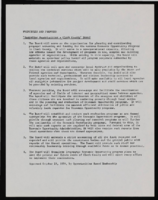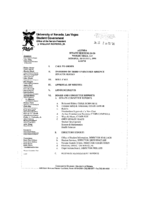Search the Special Collections and Archives Portal
Search Results
Dunes Hotel and Casino Records
Identifier
Abstract
The Dunes Hotel and Casino Records are comprised of administrative, publicity, and entertainment materials documenting the history of the Dunes Hotel and Casino in Las Vegas, Nevada from the years 1954 to 1992. Included are correspondence, contracts, photographs, hotel budgets, and an early aerial photograph of the property. The material provides a significant amount of historical documentation of the hotel that was long known to tourists and residents as the "the Miracle in the Desert."
Archival Collection

Economic Opportunity Board of Clark County (Nev.): rosters, correspondence
Date
Archival Collection
Description
From the Clark County Economic Opportunity Board Records -- Series I. Administrative. This folder contains reports, correspondence, and rosters of the Economic Opportunity Board of Clark County, Nevada from 1964 through 1970.
Text
Clarence Ray oral history interview
Identifier
Abstract
Oral history interview with Clarence Ray conducted by Eleanor L. Walker in 1991 for the African American in Las Vegas: a Collaborative Oral History Project. In this interview, Ray provides details of his ancestry and upbringing, his education, and race relations in the western United States before 1930. He then moves on to his first visit to Las Vegas, Nevada in 1922, and his movements before settling permanently in the 1940s. He explains that the main source of employment for the relatively small Black population during the 1920s and early 1930s was the railroad, but a number were also in business. Mr. Ray provides thumbnail sketches of many of the early residents, and is particularly informative about "Mammy" Pinkston, Mary Nettles, the Stevens family, and the Ensley family. Systemic racial discrimination against Blacks developed in southern Nevada during the 1930s, and Mr. Ray provides some useful details on this along with his discussion of his career in gaming and his social and political activities.
Archival Collection
Randall Cannon oral history interview, 2024 July 01
Level of Description
Scope and Contents
Oral history interview with Randall Cannon conducted by Stefani Evans and Claytee D. White on July 1, 2024 for Game On! The Oral History of Las Vegas Sports project. In this interview, Randall Cannon describes growing up in Las Vegas, Nevada. His mother married Joe Cannon, and the family soon bought a house on Van Buren south of Owens, where they lived for fifteen years. Cannon remembers riding mini-cycles on various off-road or motocross tracks around the Valley on weekends. He remembers the early development of professional motorsports in Las Vegas through sanctioned drag races and the 1967-1969 construction of the Stardust International Raceway. Cannon discusses how he became involved in a project with Mike Gerry, and eventually collaborated with Gerry on his first book, “Stardust International Raceway: Motorsports Meets the Mob in Vegas, 1965-1971.” He also discusses Las Vegas's first Formula One race in the early 1980s, and its connection to Caesars Palace and how it was the subject of his second book. Digital audio and photographs available.
Archival Collection
Collection Name: Game On! The Oral History of Las Vegas Sports Interviews
Box/Folder: Digital File 00
Archival Component

Meeting minutes for Consolidated Student Senate University of Nevada, Las Vegas, August 01, 1994
Date
Archival Collection
Description
Text
Neon Survey forms, 2002-2003
Level of Description
Scope and Contents
The files in this series are primarily comprised of digital images of neon signs around Las Vegas, Nevada and survey forms from the Neon Survey project conducted from 2002 to 2003. The files in this series are available in Microsoft Word, JPEG, and PSD file formats.
Archival Collection
Collection Name: Southern Nevada Neon Survey Records
Box/Folder: Digital File 00
Archival Component
Maggie Mancuso Collection of Film Locations
Identifier
Abstract
The Maggie Mancuso Collection of Film Locations dates from 1994 to 2001 and consists primarily of color photographs of locations throughout Las Vegas, Nevada for the film
Archival Collection
Judge John F. Mendoza oral history interview
Identifier
Abstract
Oral history interview with Judge John F. Mendoza conducted by an unnamed interviewer on the dates September 30, 2005, October 14, 2005, and October 21, 2005 for the Boyer Early Las Vegas Oral History Project. In this interview, Mendoza talks about his early life and his childhood while growing up in the Westside area of Las Vegas, Nevada. He details the lives of his grandparents as they lived through the Mexican Revolution. Mendoza describes how he grew up in a diverse community that consisted of people from different backgrounds and cultures. A big part of his childhood was when he would sell newspapers to people in public places like bars. He talks about his career and explains that he completed and graduated from law school after being discharged from the United States Army. A crucial event that took place during Mendoza's time in law school was the rise of Communism, and he explains that students and professors in his law school had various perspectives on how Communism would influence the government.
Archival Collection
Clarence Gilyard oral history interview
Identifier
Abstract
Oral history interview with Clarence Gilyard conducted by Barbara Paige on December 02, 2014 for the African Americans in Las Vegas: a Collaborative Oral History Project. Gilyard begins the interview by discussing his upbringing on United States Air Force bases, his father's career as an Airman, and the advantages he had attending Air Force schools as a child as opposed to attending public schools, where he may have faced discrimination as an African American. He describes his higher education, playing college football, and later pursuing a career in acting after becoming involved in local theatre while attending college at California State University, Long Beach. Gilyard continues, detailing how he gained more acting work and eventually acted alongside actors like Jim Carrey, Andy Griffith, and Chuck Norris, as well as starred in film and television series such as Top Gun, Die Hard, Matlock, and Walker, Texas Ranger. He concludes by discussing his career as an acting teacher and continuing his own education.
Archival Collection
Alex Kang oral history interview
Identifier
Abstract
Oral history interview with Alex Kang conducted by Cecilia Winchell and Stefani Evans on October 4, 2022 for the Reflections: The Las Vegas Asian American and Pacific Islander Oral History Project. In this interview, Kang discusses his childhood moving back and forth between Pusan, South Korea and America as his parents sought the best place to raise their children. Kang recalls the multitude of endeavors he has heavily invested in since he was young, from moving to Brazil to pursue his interests in soccer to practicing golf every single day in his youth. Kang attended San Diego State University on a scholarship to play golf and majored in math. He got involved in a party bus business, honed his golf skills, and decided to learn how to count cards at the casino. Kang moved to Las Vegas, Nevada in 2013. Throughout the rest of the interview, Kang discusses how he organizes extravagant events, including an event hosting the popular K-Pop group BTS in Las Vegas, his golfing career, and enjoying his life surrounded by his family.
Archival Collection
